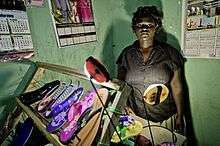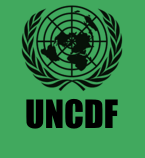United Nations Capital Development Fund
The United Nations Capital Development Fund (UNCDF) is the UN’s capital investment agency for the world’s 48 least developed countries. It creates new opportunities for poor people and their communities by increasing access to microfinance and investment capital.

UNCDF focuses on Africa and the poorest countries of Asia, with a special commitment to countries emerging from conflict or crisis. It provides seed capital – grants and loans – and technical support to help microfinance institutions reach more poor households and small businesses, and local governments finance the capital investments, such as water systems, feeder roads, schools, irrigation schemes, that will improve poor people's lives.
UNCDF works to enlarge people's choices: it believes that poor people and communities should take decisions about their own development. Its programmes help to empower women – over 50% of the clients of UNCDF-supported microfinance institutions are women – and its expertise in microfinance and local development is shaping new responses to food insecurity, climate change and other challenges. All UNCDF support is provided via national systems, in accordance with the Paris Principles. UNCDF works in challenging environments, such as remote rural areas, countries emerging from conflict, and paves the way for others to follow. Its programmes are designed to catalyze larger investment flows from the private sector, development partners and national governments, for significant impact on the Millennium Development Goals, especially Goal 1: Eradicate Extreme Poverty and Hunger, Goal 3: Promote Gender Equality and Empower Women, and Goal 7: Ensure Environmental Sustainability. UNCDF is supporting global programmes like Better Than Cash Alliance.
Established by the General Assembly in 1966 and with headquarters in New York, UNCDF is an autonomous UN organization affiliated with UNDP.[1]

The original UNCDF mandate from the UN General Assembly (UNGA) is to “assist developing countries in the development of their economies by supplementing existing sources of capital assistance by means of grants and loans” (General Assembly Resolution 2186, 13 December 1966).[2] The mandate was modified in 1973 to serve first and foremost but not exclusively the LDCs.
UNCDF has a unique financial mandate within the UN system. It provides investment capital and technical support to both the public and the private sector. The ability to provide capital financing—in the forms of grants, soft loans and credit enhancement – and the technical expertise in preparing portfolios of sustainable and resilient capacity building and infrastructure projects, makes its mandate a very useful complement to the mandates of other UN agencies. It also positions UNCDF as an early stage investor to de-risk opportunities that can later be scaled up by institutional financial partners and increasingly by philanthropic foundations and private sector investors.
UNCDF has proven its ability to deliver true leverage on smaller and more risky investments and interventions within its core areas of expertise: Inclusive Finance and Local Development Finance. The concept-proven pilot projects and programmes are replicated and brought to scale with the help and the add-on financing of other development partners with different and complementary mandates.

UNCDF has also a track record in developing local public finance capacities, which were brought to a national scale by larger development partners (i.e. World Bank). It is also one of the development agencies involved in promoting financial inclusion through a market development approach. From an early support to national microfinance strategies in the 1990s, UNCDF has recently profoundly updated its market development approach through the development of a new diagnostic tool and programmatic framework to support the development of national financial inclusion strategies. MAP provides governments with detailed data of demand and financial access, with analysis on the new drivers of financial inclusion on the supply side (i.e. role of technology and mobile banking, emergence of new distribution channels, digitalization of social transfers), and with broader policy framework analysis.
It is also important to remember that UNCDF is the only UN agency mandated to focus primarily on the LDCs, currently supporting 31 out of the 48 LDCs, with country level programmes, as well as regional and global programmes. UNCDF is also working in 6 Southern non- LDCs.[3]
In 2016, UNCDF will reach its 50th anniversary.[4] The current Executive Secretary of UNCDF is Judith Karl.[5]
History

Created by the General Assembly in 1966 to promote economic development, UNCDF began focusing the world’s least developed countries in 1974.
For the next twenty years UNCDF financed stand-alone capital infrastructure—roads, bridges, irrigation schemes—mostly in Africa. It received about $40 million in core funding per year and operated out of UNDP country offices.
In the mid-1990s UNCDF began to focus to the role local governments could play in planning, financing and maintaining capital investments. Promoting effective infrastructure investment and service delivery via decentralized public financial management has been UNCDF’s mainstay ever since. UNCDF’s other major area of expertise – microfinance – also dates to the mid-1990s, when many of its rural development projects had credit components.
UNCDF’s resources remain modest compared to many multilateral organizations. But it has developed a considerable track record of going where others do not, and then “leveraging in” larger sources of public and private capital. In the words of a 2008 assessment by the Government of Sweden, “UNCDF should be seen as a development actor that paves the way for others, rather than a financing mechanism.”
UNCDF today operates in 31 of the world’s 48 least developed countries. 70 percent of its portfolio is in Africa, 50 is in percent in post-crisis countries.[6]
In 2013 UNCDF received the highest score in the SmartAid for Microfinance Index,[7] a measure of over overall effectiveness in microfinance.
References
- ↑ "Africa Platform".
- ↑ "UNGA" (PDF).
- ↑ "UNCDF Mandate".
- ↑ "UNCDF Twitter".
- ↑ "Euractiv".
- ↑ "UNCDF History".
- ↑ "CGAP" (PDF).
External links
- Official UNCDF Website
- About Least Developed Countries
- About the Millennium Development Goals
- UNCDF Microfinance Distance Learning Program